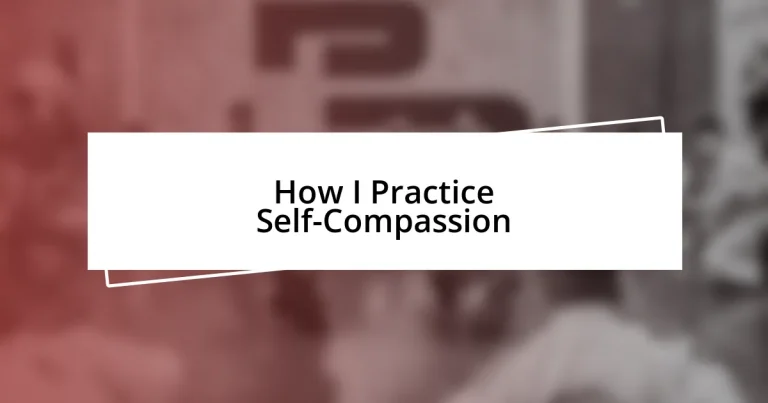Key takeaways:
- Self-compassion involves treating oneself with kindness, recognizing shared human experiences, and practicing mindfulness.
- Practicing self-compassion enhances emotional resilience, improves mental well-being, and fosters healthier relationships.
- Techniques such as mindful breathing, journaling, and self-soothing are effective ways to cultivate self-compassion.
- Challenging self-criticism and setting boundaries can lead to deeper connections and greater personal growth.
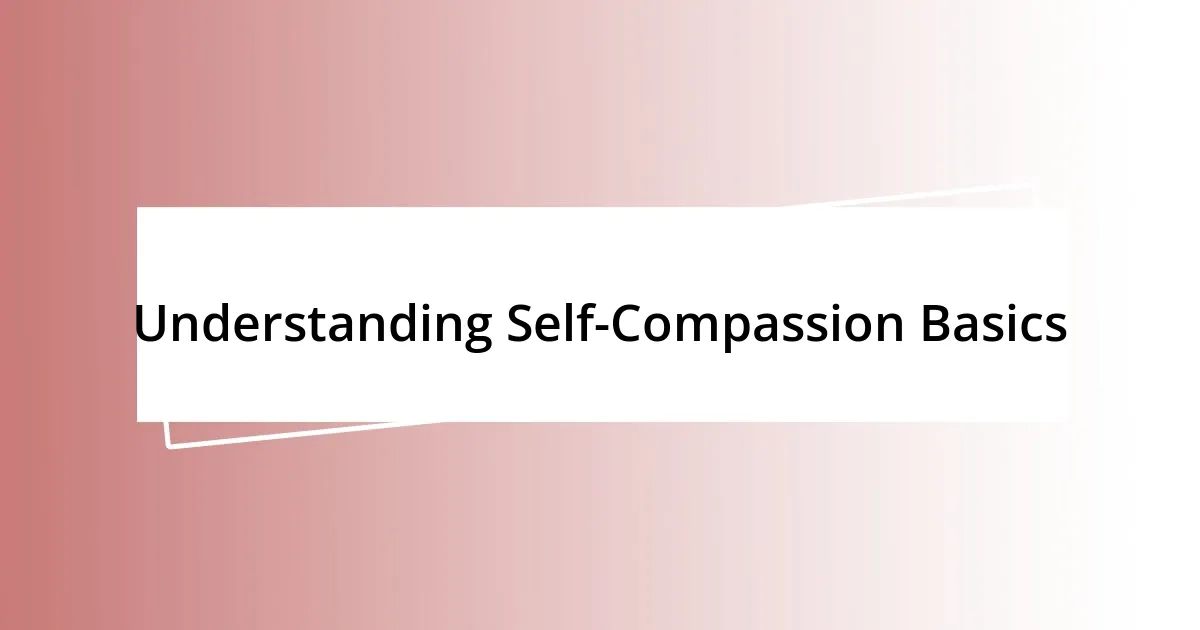
Understanding Self-Compassion Basics
Self-compassion is essentially about treating ourselves with the same kindness and understanding that we would extend to a friend. I remember a particularly challenging day when I made a mistake at work. Instead of berating myself, I took a moment to acknowledge the slip-up, reminding myself that everyone makes mistakes. Isn’t it interesting how we often forget to offer ourselves that same grace?
At its core, self-compassion involves three key elements: self-kindness, common humanity, and mindfulness. Embracing our shared human experience can be incredibly liberating. I often find myself reflecting on how many of us struggle with similar feelings of inadequacy or failure. When I acknowledge that others are in this together, it feels less isolating and more like an opportunity for connection.
Mindfulness plays a crucial role in self-compassion; it helps us face our emotions without judgment. One time, I was feeling overwhelmed with anxiety, and instead of suppressing those feelings, I chose to sit with them for a moment. This small act of recognizing my feelings allowed me to process them and act with kindness towards myself rather than spiraling into negativity. How often do we overlook this vital step in cultivating a more compassionate relationship with ourselves?
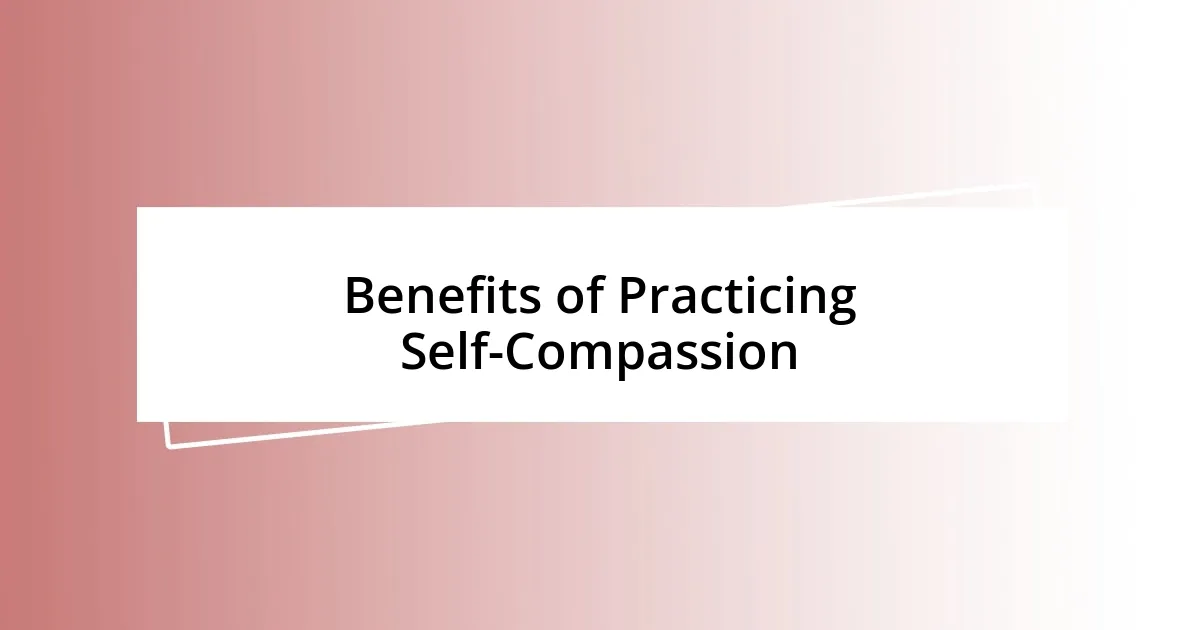
Benefits of Practicing Self-Compassion
When I consider the benefits of practicing self-compassion, one major advantage that stands out to me is the enhancement of emotional resilience. I’ve noticed that when I approach my setbacks with compassion, I bounce back more quickly. It’s like giving myself permission to feel hurt while also encouraging myself to move forward. I remember a particularly tough time in my life when I lost a close friend. Instead of pushing through my grief, I allowed myself to be sad and comforted myself, knowing that this was a part of healing. By doing so, I emerged stronger and more understanding of my own needs.
Another significant benefit is improved mental well-being. Research indicates that self-compassion can reduce anxiety and depression. Personally, I’ve experienced a shift in my mindset when I practice self-compassion regularly. I used to spiral into negative thoughts after making small errors, but now I gently remind myself that everyone encounters bumps along the road. It’s this shift that has allowed me to cultivate a sense of peace within. How many of us could benefit from treating ourselves as our best friends would?
Lastly, self-compassion fosters healthier relationships. I’ve observed that when I’m kinder to myself, I’m less likely to be judgmental towards others. This sense of understanding can create a more supportive environment, not just for me but for those around me too. For instance, during a recent group project, my enhanced self-compassion enabled me to offer support to a struggling teammate rather than respond with impatience. It’s amazing how nurturing our inner dialogue can ripple out, positively impacting our interactions with others.
| Benefit | Personal Experience |
|---|---|
| Emotional Resilience | Allowed myself to grieve a loss and emerged stronger. |
| Mental Well-being | Shifted from negative spirals to fostering inner peace. |
| Healthier Relationships | Enhanced support for others led to greater teamwork. |
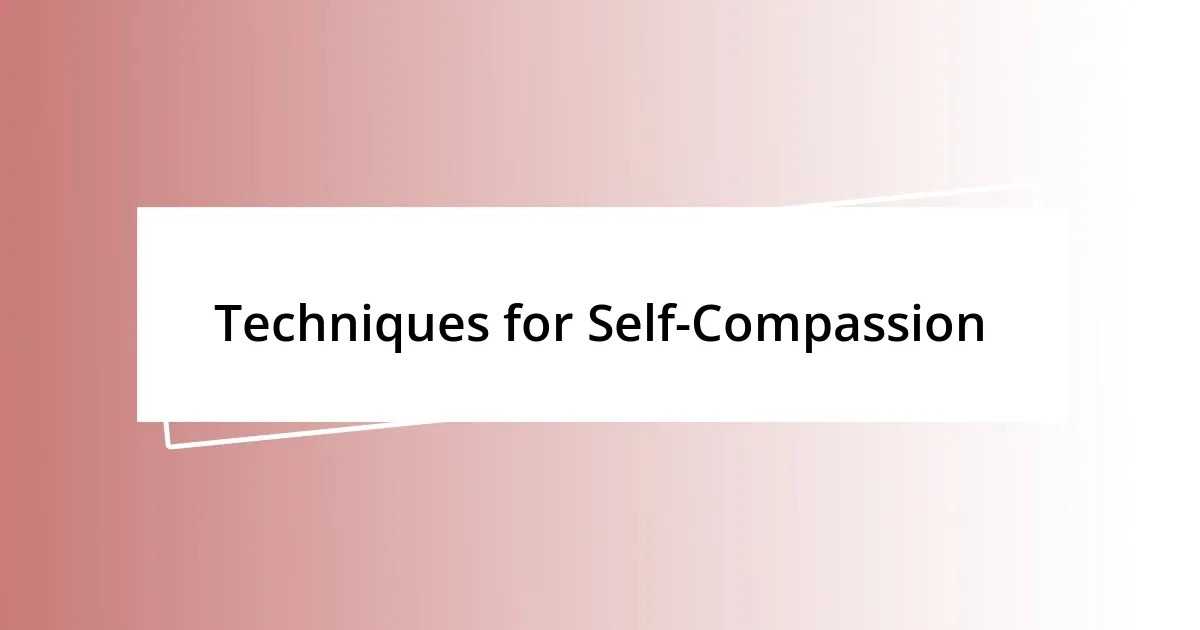
Techniques for Self-Compassion
It’s important to have practical techniques that can guide us on our self-compassion journey. For me, journaling has been a powerful tool. On days when my inner critic is particularly loud, I take a few minutes to write down my thoughts. I often find that putting my feelings on paper helps to externalize the negativity. It’s like having a conversation with myself, where I can say, “Hey, it’s okay to feel this way. You can move through it.” I’ve realized that this simple act can provide clarity and space for self-kindness.
Here are some techniques that can foster self-compassion:
- Mindful Breathing: Taking a few deep, conscious breaths can ground you. It brings your focus to the present, allowing you to acknowledge your feelings.
- Self-Soothing Practices: Engage in activities that make you feel nurtured, like a warm bath or listening to calming music. This signals to your brain that you are worthy of care.
- Affirmations: Create your own self-compassion affirmations. I often say to myself, “I deserve kindness and understanding, just like everyone else.” This repetition can rewire your internal dialogue over time.
- Visualizing Compassion: Picture a loved one who expresses unconditional love for you, then visualize extending that same love to yourself. This can create a powerful emotional shift.
- Compassionate Letter Writing: Write a letter to yourself as if you were consoling a dear friend going through a tough time. I find this exercise absurdly healing, allowing me to express the same empathy I would naturally offer to others.
Incorporating these techniques has, for me, deepened my relationship with myself. I now view challenges as opportunities for growth instead of as insurmountable hurdles.
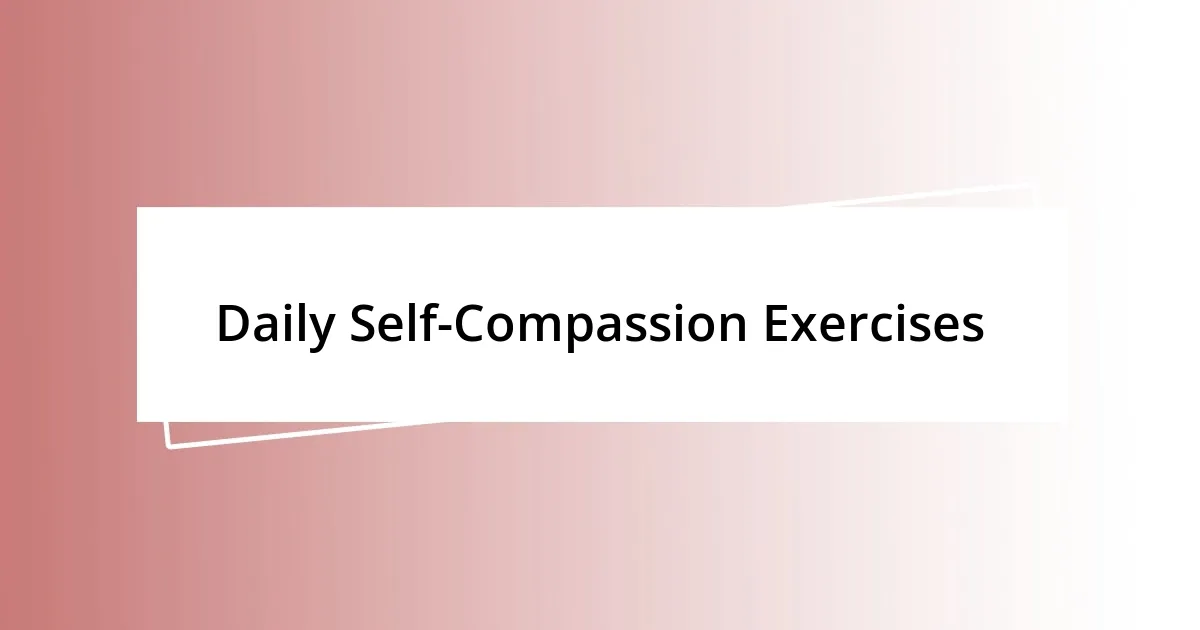
Daily Self-Compassion Exercises
Daily self-compassion exercises can be simple yet powerful. I often start my mornings with a mindful breathing practice. Just a few minutes of deep breathing allows me to center myself and acknowledge any feelings of anxiety or self-doubt that may be lingering from the previous day. It’s fascinating how this moment of calm can subtly shift my mindset, creating a more compassionate frame for the hours ahead.
Another exercise that I cherish is the practice of self-soothing. I remember a particularly stressful week when I felt overwhelmed. To counteract that, I decided to dedicate an evening to self-care, complete with my favorite herbal tea and a relaxing playlist. This act of nurturing not only calmed my nerves but also reinforced the belief that I deserve the same care I readily give others. When was the last time you treated yourself to something that brought you joy?
Writing compassionate letters to myself has also become a cherished routine. On tough days, I sit down and draft a letter with the same kindness I would extend to a friend who’s struggling. I recall feeling particularly low after some setbacks at work. As I poured my heart out in that letter, reminding myself that making mistakes is human, I felt an immense weight lift off my shoulders. Engaging in such exercises transforms my inner dialogue, making it more supportive and understanding. It’s incredible how the words we speak to ourselves can shape our experiences.
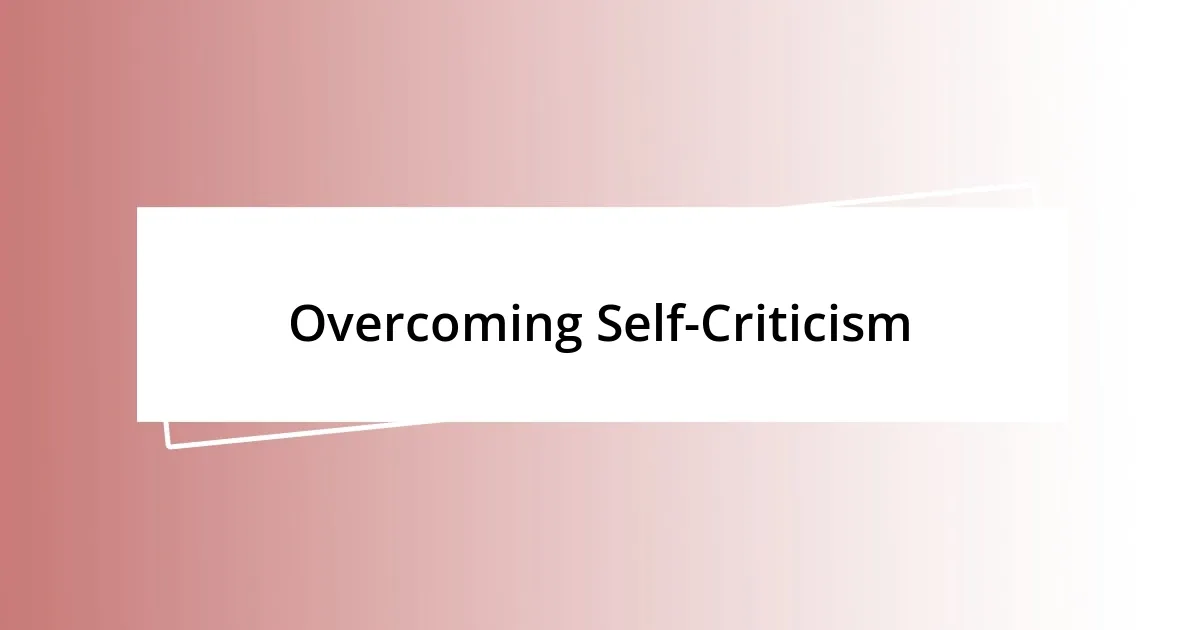
Overcoming Self-Criticism
Self-criticism can feel relentless, but I’ve learned that challenging those harsh thoughts is an essential step in cultivating self-compassion. For instance, when I catch myself spiraling into negative self-talk—thinking I’m not good enough or that I’ve failed in some way—I pause and ask myself, “Would I speak to a friend this way?” More often than not, the answer is a resounding no. This realization helps me reframe my thoughts and respond with kindness instead.
I remember a time when I was consumed by self-doubt after not achieving a personal goal. Instead of letting the criticism take root, I started acknowledging my feelings without judgment. I allowed myself to feel disappointed but reminded myself that growth often comes from setbacks. It’s a powerful shift when I recognize that my worth isn’t tied to my accomplishments but instead rooted in my humanity. This practice of self-reflection and acceptance has made a significant difference in my life.
Overcoming self-criticism also means allowing myself to be imperfect. I think about how I often compare my journey to others, which creates a cycle of negative thoughts. One day, I decided to write down my accomplishments, no matter how small. I found it surprisingly uplifting! By celebrating my progress rather than critiquing my shortcomings, I cultivate a sense of gratitude that drowns out the inner critic. Isn’t it fascinating how we can shift our perspective by simply highlighting the good in ourselves?
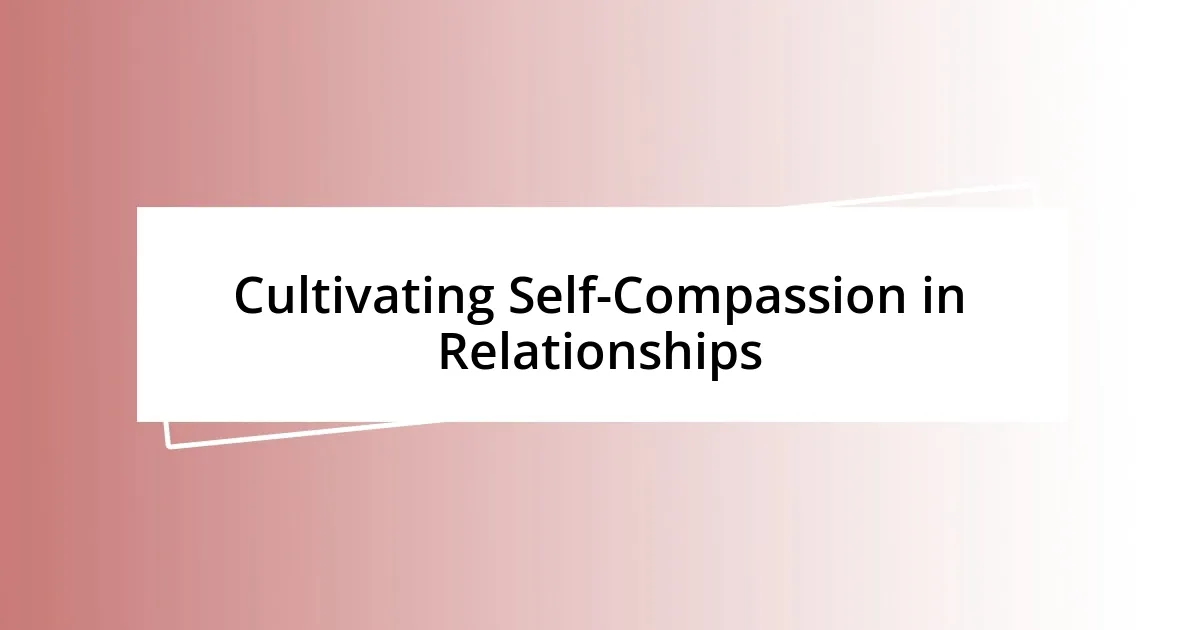
Cultivating Self-Compassion in Relationships
In relationships, practicing self-compassion can profoundly alter how we connect with others. I recall a time when a close friend and I had a misunderstanding. Instead of immediately reacting defensively, I took a moment to explore my feelings of hurt and frustration. By allowing myself to process those emotions, I was able to return to the conversation more open and understanding. Have you ever noticed how a little self-reflection can change the tone of a discussion?
I find that extending compassion to myself during conflicts also shapes my empathy toward others. When I acknowledge that I, too, am deserving of understanding, it becomes easier to give that same grace to a partner or a friend. During a particularly challenging disagreement, I reminded myself that both of us were imperfect beings trying our best. This shift in mindset transformed the situation from a stance of confrontation to a space for collaboration. Isn’t it refreshing how kindness can pave the way for resolution?
Additionally, I’ve learned the importance of setting boundaries for my emotional well-being. There was a time when I felt drained from constantly trying to please everyone around me. I decided to take a step back and prioritize my needs. This wasn’t about being selfish; it was about respecting my own limits, which ultimately allowed me to show up more fully for the people I care about. In what ways could setting healthy boundaries empower your relationships?
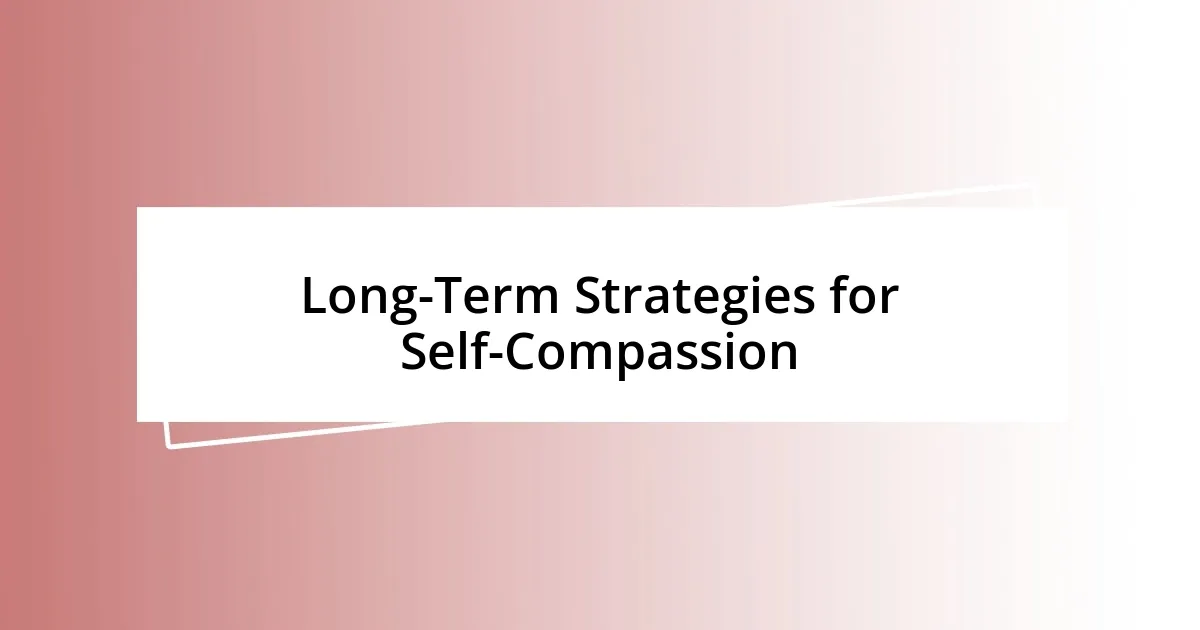
Long-Term Strategies for Self-Compassion
Shifting to long-term strategies, one technique that has become a game changer for me is the practice of mindfulness. I often set aside a few minutes each day to simply pause and breathe. During these moments, I check in with myself—what am I feeling? What thoughts are swirling around in my mind? Establishing this regular mental check-in helps me cultivate a deeper awareness of my emotions, allowing me to meet myself with compassion before I even reach a point of distress.
Another strategy I find valuable is journaling my experiences. There’s something incredibly therapeutic about putting pen to paper. I share not just my victories but also my struggles and frustrations. This practice creates a safe space for me to express feelings I might otherwise bottle up. Reflecting on these entries later often reveals patterns in my thinking that I can then address with compassion. It’s like having a conversation with my past self—understanding where I came from helps me navigate the present with more kindness. Have you tried journaling to explore your feelings?
I also believe that building a supportive community is crucial for long-term self-compassion. Surrounding myself with those who uplift and encourage me has transformed my perspective. I recall reaching out to a group of friends during a particularly tough time, and their understanding was a balm to my soul. Sharing my vulnerabilities made me realize that everyone has their share of struggles. This shared experience fosters a sense of connection that reminds me I’m not alone on this journey. How have your relationships influenced your own self-compassion?












